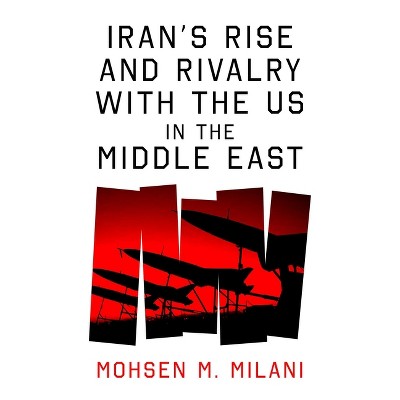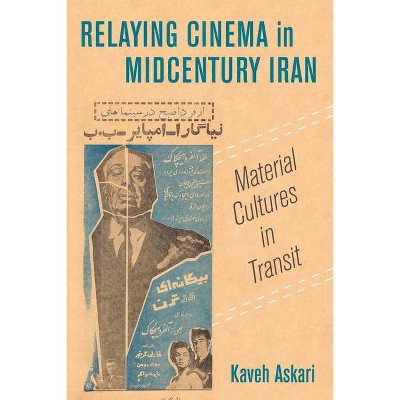Sponsored

Imagining Iran - by Majid Sharifi (Hardcover)
$162.00
In Stock
Eligible for registries and wish lists
Sponsored
About this item
Highlights
- The thematic focus of this book is the tragic yet inevitable effects of subaltern nationalism.
- About the Author: Majid Sharifi is assistant professor in international affairs and government at Eastern Washington University.
- 374 Pages
- Political Science, World
Description
About the Book
The thematic focus of this book is the tragic yet inevitable effects of subaltern nationalism. The book covers the systemic challenges that all modern Iranian regimes have faced in establishing a sovereign, developed, democratic, and constitutional nation-state.Book Synopsis
The thematic focus of this book is the tragic yet inevitable effects of subaltern nationalism. The book covers the systemic challenges that all modern Iranian regimes have faced in establishing a sovereign, developed, democratic, and constitutional nation-state.Review Quotes
Majid Sharifi breaks new ground in connecting the development of Iranian nationalism to the imperial and colonial experiences of other subaltern states. His book fits within the emerging field of coloniality/decoloniality. It shows that the darker side of modernity has shaped Western as well as non-Western societies. This book makes an important contribution to our understanding of global/local affairs.
Majid Sharifi thoroughly researches politics in Iran for the past one-hundred years. He depicts the five regime changes accurately and then reviews the fundamental dynamics of the rise and fall of each regime and why it is that they have all failed to nationalize their narrative of Iranianness. Any reader of Imagining Iran will walk away with a well-informed sense of political history of Iran, especially in relation to what the state has accomplished and not accomplished in the past vis-à-vis the Iranian population.
This expansive book seeks to explain why different Iranian regimes that came to power after the 1905-06 constitutional revolution have unsuccessfully sought to define 'Iranianness.' Sharifi explains the political dynamics of the rise and fall of each regime in terms of the inability of each type of government, whether secularist or Islamic, to make its narrative of 'Iranianness' inclusive enough to make the state into the embodiment of the country's heterogeneous people. He further demonstrates that the failure to politically and socially engage the elites and masses around the state's official identity have had several consequences. They included securitization of Iran's sociopolitical space, various regimes' increasing reliance on coercive and regulatory mechanisms to stay in power, and the emergence of counterhegemonic forces against the state's official identity and ideology of 'Iranianness.' Moreover, the author develops a theoretical framework for connecting the development of Iranian nationalism with those of the other states in the Middle East and South Asia that have experienced colonial and/or imperial domination. This well-researched, theoretically rigorous, and cogently argued book is highly recommended. Summing Up: Highly recommended. Upper-division undergraduate, graduate, and research collections.
About the Author
Majid Sharifi is assistant professor in international affairs and government at Eastern Washington University. He has done extensive field research in the political development of Iran and surrounding countries. His research focuses on political and security trends and transformations in the littoral states of Persian Gulf, as well as Pakistan and Afghanistan.Dimensions (Overall): 9.1 Inches (H) x 6.1 Inches (W) x 1.3 Inches (D)
Weight: 1.6 Pounds
Suggested Age: 22 Years and Up
Number of Pages: 374
Genre: Political Science
Sub-Genre: World
Publisher: Lexington Books
Theme: Middle Eastern
Format: Hardcover
Author: Majid Sharifi
Language: English
Street Date: August 22, 2013
TCIN: 1004175752
UPC: 9780739179444
Item Number (DPCI): 247-28-7268
Origin: Made in the USA or Imported
If the item details aren’t accurate or complete, we want to know about it.
Shipping details
Estimated ship dimensions: 1.3 inches length x 6.1 inches width x 9.1 inches height
Estimated ship weight: 1.6 pounds
We regret that this item cannot be shipped to PO Boxes.
This item cannot be shipped to the following locations: American Samoa (see also separate entry under AS), Guam (see also separate entry under GU), Northern Mariana Islands, Puerto Rico (see also separate entry under PR), United States Minor Outlying Islands, Virgin Islands, U.S., APO/FPO
Return details
This item can be returned to any Target store or Target.com.
This item must be returned within 90 days of the date it was purchased in store, shipped, delivered by a Shipt shopper, or made ready for pickup.
See the return policy for complete information.












